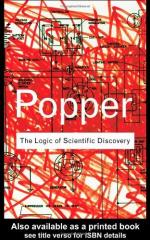
|
| Name: _________________________ | Period: ___________________ |
This quiz consists of 5 multiple choice and 5 short answer questions through Part II: Chapter 7, Simplicity.
Multiple Choice Questions
1. What does Popper consider to contribute to the cosmology of empirical science?
(a) Linguistic puzzles.
(b) Inductive frameworks.
(c) Metaphysical and philosophical ideas.
(d) Questions of fact.
2. What guides a scientific experiment?
(a) Inductive reasoning.
(b) Deductive reasoning.
(c) Logic.
(d) Theory.
3. What types of statements are scientific theories?
(a) Proven.
(b) Logical.
(c) Singular.
(d) Universal.
4. According to Popper, what can't universals be reduced to?
(a) Dogmatism.
(b) Psychologism.
(c) Infinite regress.
(d) A class of experiences.
5. What does Popper give credit to conventionalism for doing?
(a) Adapting to varying conditions.
(b) Linking theory to experiment.
(c) Blind acceptance of logic.
(d) Offering differing opinions.
Short Answer Questions
1. What will classes with greater dimensions have?
2. The success of a theory is base on what comparison?
3. What view does Popper take to analyze scientific thinking?
4. Who view natural science as a logical construction of nature?
5. What challenges Poppers use of falsification as criteria in deciding is a theoretical system is empirical?
|
This section contains 181 words (approx. 1 page at 300 words per page) |

|




